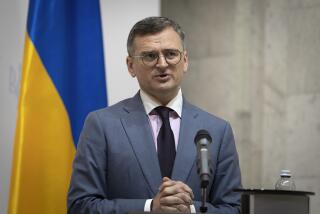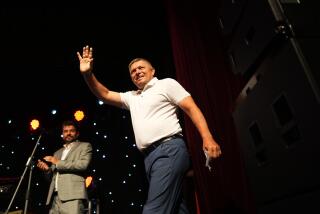Premier Backing State-Run Economy Quits in Ukraine
- Share via
KIEV, Ukraine — Prime Minister Vitold Fokin, under fire for advocating that Ukrainians return to a state-run economy, tendered his resignation Wednesday, but the fate of his ultraconservative economic plan remained unclear.
A few hundred of Fokin’s supporters, holding signs declaring “No to Capitalism,” stood outside the Parliament building in a downpour to protest criticism of the prime minister, whose resignation offer came as a surprise.
Inside, a handful of pro-market legislators applauded when President Leonid Kravchuk--long a Fokin supporter--announced the prime minister’s decision. Fokin will continue in a caretaker role until the president appoints a successor, which could take months.
Fokin, 59, a former director of central planning for the Ukrainian Communist Party, had been scheduled Wednesday to present his “plan for deepening economic reform” to the Parliament, which is dominated by conservative deputies.
The controversial program outlines a highly centralized economy, under which the state would control prices, set profit ceilings, require minimum and maximum wages and regulate interest rates.
In what some legislators have sharply criticized as a retreat to a Communist-style economy, Fokin would also maintain government ownership of large industries. In contrast, Russia embarks today on an ambitious plan to privatize state industry by issuing every citizen an investment voucher.
Kravchuk has, so far, kept quiet about Fokin’s plan, and it is not clear whether he will try to push the conservative program through.
Viktor Pinzenyk, one of the president’s economic advisers, recently ridiculed Fokin’s blueprint, saying it would only bring in capitalists “at gunpoint.”
In an article, Pinzenyk warned of economic catastrophe and social unrest if the Fokin plan is put into effect in this nation of 52 million.
Some pro-market legislators fear that Kravchuk supports the prime minister’s plan. In the wake of Wednesday’s surprise announcement, they speculated that Kravchuk had sacrificed Fokin to distract attention from his own conservative policies. “This is a maneuver,” lawmaker Les Taniuk asserted.
Since appointing Fokin to the post of prime minister in October, 1990, Kravchuk has consistently supported his former Communist comrade.
As recently as July, the president summoned all his influence to prevent a legislative vote of no-confidence in Fokin. But since the beginning of the year, observers have noted that Fokin has frequently been forced to act as a lightning rod for Kravchuk, voicing views that were in reality those of the president.
The prime minister’s resignation requires legislative approval, and in any case, Fokin will remain in power until Kravchuk appoints a replacement.
Elsewhere in the former Soviet Union, ethnic unrest continued.
Armenia reported regaining control of the strategic highway leading to the capital of Nagorno-Karabakh, the disputed enclave of ethnic Armenians inside neighboring Azerbaijan. Fighting in the region has claimed 3,000 lives during the last four years.
In the Caucasus Mountains, Muslim Abkhazian separatists and their supporters launched new attacks on the Georgian government. Also in western Georgia, security forces had their hands full battling supporters of deposed President Zviad Gamsakhurdia, who fled the capital in January.
And in Tajikistan, 10,000 refugees have flooded into the capital of Dushanbe, fleeing violence in the Kurgan Tyube region near the Afghanistan border, Russia’s Itar-Tass news agency reported.
More to Read
Sign up for Essential California
The most important California stories and recommendations in your inbox every morning.
You may occasionally receive promotional content from the Los Angeles Times.













